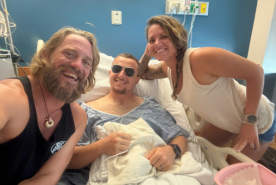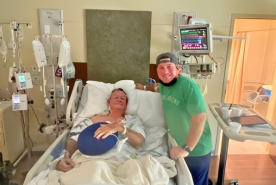To get a kidney transplant, you need to contact a transplant center ("referral”), complete an evaluation with the transplant team, and be approved for transplant.
Table of Contents
First step to getting a transplant
If you have kidney failure, choosing to try and get a kidney transplant is a big decision. It can take a few months or longer to get on the waitlist, then even longer to get a kidney from a deceased donor or to find a living donor. Be patient and keep going!
The first step to getting a transplant is a referral to a transplant center that you choose. You can ask your doctor for a referral, which is usually best, or you can contact a transplant center on your own. This is called a “self-referral.”
It’s very important to remember that having chronic kidney disease or being on dialysis does not automatically put you on the transplant waiting list. You must work with a transplant center directly to be evaluated and placed on the waiting list.
How to choose a transplant center
You can search for transplant centers to learn more about their waiting times and more. Choose a transplant center that best fits your needs. Things you should consider when choosing one include:
- Insurance coverage and cost. Ask your health insurance company or call the transplant center for more information.
- The transplant center location, to make it easier to get to for appointments and surgery.
- If you are interested in a living donor kidney transplant, be sure the transplant center performs living donor transplants. Ask the transplant center if they participate in “kidney paired exchange” or “paired donation” programs so you can still get a living donor kidney if your living donor isn’t the best match for you. Learn more about paired donation here.
- Find out if the center offers a support group. You can also speak to someone who has a received or donated a kidney through our NKF PEERS program.
The transplant evaluation
To get a kidney transplant (also called a renal transplant), you have to start and finish an evaluation at a transplant center. The evaluation will include education about transplant and many tests and conversations. The goal is to make sure you are healthy enough for a transplant, and you are ready to take care of the new kidney you receive.
At most transplant centers, the evaluation takes 1-2 full days. During the evaluation, you can expect to have several medical tests done and meet with all of the members of the transplant team. You may also be asked to have more tests done after your evaluation to help the team decide if a kidney transplant is right for you. It can be helpful to have a family member or friend come with you for support and to help you remember all of the information the team covers during your visit.
Depending on what caused your kidney disease, like Type 1 diabetes, the transplant team may recommend getting a kidney -pancreas transplant, called a dual transplant or simultaneous kidney-pancreas transplant (SKP.) Your transplant team will talk to you about which type of transplant is best for you.
After your evaluation, the transplant team will let you know if you’re approved for the transplant waitlist by either calling you on the phone or sending you a letter in the mail. This is when most people start sharing their story to find a living kidney donor.
Cost and paying for a transplant
Before the transplant evaluation, the financial coordinator at the transplant center will check with your insurance provider to make sure you have the right coverage for your transplant, including the evaluation, surgery, hospital stay, and follow-up appointments. It’s also important for you to know what your insurance company covers and what you’re responsible for paying, like any out-of-pocket expenses for copays or deductibles.
If your insurance covers your transplant, they will almost always cover the medical costs of your living kidney donor. You can talk to the social worker or financial coordinator at the transplant center and reach out to your insurance provider if you have any questions about the specific insurance plans that you have.
The transplant care team
At the transplant evaluation, you’ll meet with all of the members of the transplant team, including a nephrologist (kidney doctor), surgeon, nurse coordinator, dietitian and social worker. They’ll talk to you about things like your medical history, including what caused your kidney disease, social support, mental wellness and diet. They’ll also be able to give you helpful suggestions to make improvements that could be issues towards getting on the waitlist, like quitting smoking or losing weight for surgery.
Your transplant team will be there for you throughout the entire process, including your time spent on the waitlist and when you get the call that a kidney is available for you. They will also be there after surgery and will see you at your follow-up appointments.
Being on the waitlist at more than one center
It is possible to get approved for a kidney transplant at more than one center at the same time. This is called “multi-listing.” Doing this may increase your chances of getting called for a deceased donor kidney faster. Some transplant centers also have slightly different requirements for living donors.
Oftentimes, if you’re approved for the waitlist at one transplant center, they will be able to transfer test results to another center, as long as they’ve been performed within 1 year. However, all transplant centers will require you to meet with their transplant team before being approved at their center. Comparing transplant centers can be helpful when you’re thinking about multi-listing.
Why someone may not be approved
There are many reasons why someone may not be approved for a transplant, including having certain health conditions like active cancer or not being healthy enough for the surgery. While all transplant centers have the same basic requirements, each center looks at different factors, like age, weight and the current health of a patient. There are very few health conditions that would disqualify you from getting a transplant at all transplants centers. Sometimes, the transplant team may ask you to come back in three or six months to give you time to lose weight or stop smoking before being able to get approved for the waitlist. You’re always able to get evaluated at more than one transplant center, even if you’re not approved at one center.
Each transplant center sets its own guidelines for transplants. Some transplant centers may have restrictions or rules around age. Doing research will help you find the transplant center that fits your needs.
Getting approved for transplant waitlist
After you complete the entire evaluation, the transplant team will work together to approve you, or not, depending on what they find. The transplant center will notify you if you’ve been approved for the waitlist.
Once this happens, it’s important to stay healthy while waiting for a transplant. Make sure you go to your scheduled doctor’s appointments and stay on a kidney-friendly diet. This is also a good time to start thinking about sharing your story to find a living donor.
Questions to ask
For your nephrologist/kidney doctor
- Do you have a recommended transplant center for me based on my needs?
For the transplant team
- How long does the evaluation usually take at your center? How many times do you expect I will have to come back?
- Do you have any concerns about my health that might make getting a transplant difficult?
- Does your center do paired kidney donations? What resources do you offer to help me find a living donor?
- What other costs should I know about during the evaluation or transplant?

















